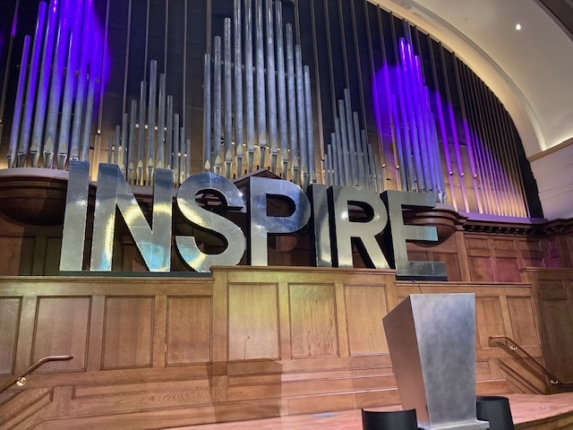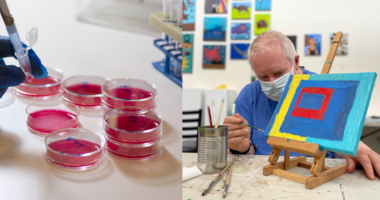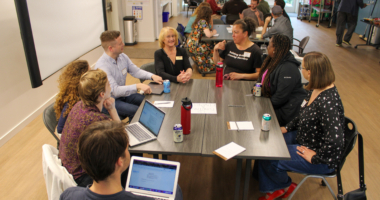
We are profoundly grateful to UW Medicine and Susan Brotman for honoring the Kuni Foundation with the 2023 UW Medicine Brotman Leadership Award. It is an honor to support this work. We draw constant inspiration from the ground-breaking research and deep commitment to equity that is the cornerstone of the work taking place at UW Medicine.
The following is reprinted with permission from University of Washington Medicine. Original post – https://give.uwmedicine.org/stories/backing-the-bold-ideas-in-cancer-research/
Written by Alice Skipton
“When you are doing equity work, you are tackling the hardest problems in an area,” says Kemi Doll, MD, MSCR, Fred Hutch physician and associate professor in the Department of Obstetrics and Gynecology at the University of Washington School of Medicine. “You are not assuming the best circumstances, but rather what happens when everything goes wrong. That’s why what we find out is helpful to everyone.”
Doll is one of the cancer researchers funded by the Kuni Foundation, which is the 2023 recipient of the UW Medicine Brotman Leadership Award. Named in honor of Jeffrey and Susan Brotman, the award honors those whose visionary philanthropy significantly impacts UW Medicine’s ability to improve the health of the public.
“We’re honored to support the groundbreaking work of outstanding researchers like Dr. Doll,” says Angela Hult, president of the Kuni Foundation. Since 2020, the Kuni Foundation has provided 38 grants, totaling more than $14.5 million, to UW Medicine researchers.
The Kuni Foundation’s support of adult oncology research at Fred Hutchinson Cancer Center, which serves as the cancer program for UW Medicine, and at the Cancer Vaccine Institute at UW Medicine fills a vital gap, accelerating progress where it’s needed most. In Doll’s case, her current work seeks answers and solutions for why Black women have higher rates of, and disproportionately high death rates from, endometrial cancer.
“Before Kuni Foundation funding, we didn’t have the kind of dataset needed to help us understand how the clinical care and diagnostic process may or may not be contributing to this problem of late-stage diagnosis among Black women,” says Doll.
Setting out to prove a hunch, Doll and her team created a database of 3,500 Black people who had hysterectomies and early findings support that what she suspected was true. The current clinical care guidelines to evaluate ultrasound findings and determine risk of endometrial cancer underdiagnose Black women.
“By studying the diagnostic care pathway algorithms,” says Doll, “we’re trying to develop guidelines that will help doctors be most accurate, when somebody comes in with worrisome symptoms, to diagnose people who have endometrial cancer and reassure those who don’t.
This work will help improve care, provide comfort and save lives. And it’s happening because the Kuni Foundation understands the need for flexible, equitable support in research funding.”
Helping emerging leaders gain traction
“We launched our Discovery and Imagination grants for cancer research during the pandemic, when funding for cancer and other forms of medical research was in steep decline and our health care system’s deep inequities became apparent,” says Hult. “Early-career researchers, or projects perceived as too bold or too narrowly focused, struggled to obtain funding. It was a disheartening time for the field, and we were alarmed by the risk of losing a generation of cancer researchers and the advancement of the kind of disruptive, impactful exploration that leads to lifesaving treatments. We intentionally began providing catalytic funding to emerging leaders and creative approaches to help innovative ideas gain traction.”
The Kuni Foundation supports work that enables researchers to take more risks than are allowed by most government grants. The foundation also looks for opportunities to help early-career researchers and researchers who are focused on the intersection of cancer and health equity. By accelerating this critical, lifesaving work, the foundation can boost progress and help researchers like Doll leverage additional support and ultimately transform clinical care.
In addition, Doll points out, equity work needs funding that supports community engagement and acknowledges the time it takes to build trust, especially in the context of healthcare.
“In order to be accurate about the problems, you have to be in relationship with the community you’re trying to help,” says Doll. “Most mainstream funding often doesn’t include helpful ways to compensate community members. Sometimes you have three meetings with food before you get to the discussion, and if you don’t have three meetings, you’re not going to get there. It’s not a nice-to-have, it’s vital — and Kuni understands this more holistic way to fund.”
In supporting emerging leaders and bold approaches, the Kuni Foundation also understands that not every effort will yield the same results as Doll’s project. They know that cancer is constantly adapting and evolving and isn’t waiting for a fully vetted proof of concept tied with a bow.
“We embrace risk, and risk is vital to advancing the kind of exploration that yields new discoveries,” says Hult. “If an approach doesn’t pan out, it’s not a failure. All research yields value, and the learning is a significant return on investment that’s critical to the evolution of the work. We’re energized by the diverse range of high-risk, high-reward approaches generated by UW Medicine’s researchers and excited to be on this journey of discovery.”
Partners in progress
The Kuni Foundation is intentional about supporting the people leading the work. “We recognize the tenacity required to develop a project, find partners and obtain funding,” says Hult. “Often, researchers are also treating patients, teaching classes and juggling a multitude of activities outside the lab. It’s important to understand these circumstances and support the whole person.”
“The Kuni Foundation makes a point to support me as an individual,” says Doll. “Knowing the support tangibly represents a person who believes in your work opens more creativity, resilience and determination. Beyond money, it’s a real partnership, and it makes me do better science.”
Another benefit to focusing on the people side, Doll says, is that whole-person support gives a researcher the ability to replicate themselves. With protected time to leverage their experience and knowledge through teaching and mentoring, faculty can help trainees and junior researchers on their path.
Partnerships like this also spur more momentum. In 2022, Doll received a Victoria’s Secret Global Fund for Women’s Cancers Rising Innovator Research Grant in partnership with Pelotonia and the American Association for Cancer Research. “We were one of five projects in the world that got one,” says Doll. “There’s no way we would have gotten it if Kuni hadn’t seen the potential in me and the research first.”
Tackling the biggest problems often means fearlessly backing innovative ideas. For Doll — and many other change-making researchers at UW Medicine and Fred Hutch Cancer Center — the Kuni Foundation is stepping up to move medicine forward.




